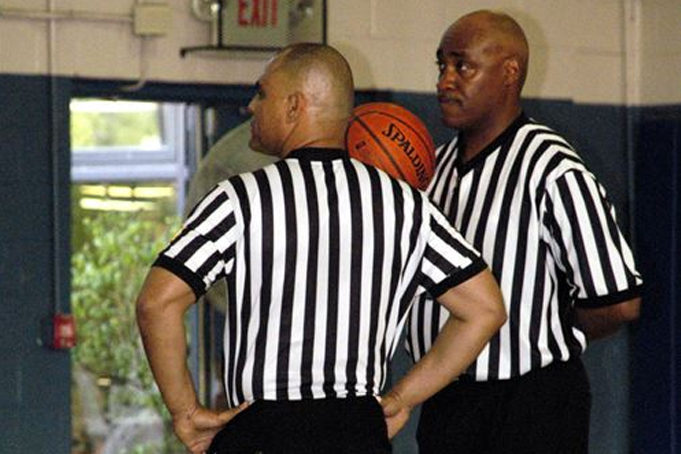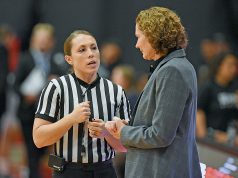Unfortunately, in today’s culture, many officials have been followed out to their car by unfriendly people after a game. Others have been threatened during or after a game or perhaps even endured a physical assault. It takes a coordinated effort to deal with the problem of attacks against officials. That coordination begins with local officials associations or, for those officials who work directly for a league, the league that hires the officials.
Associations’ Role
An officials association needs to regularly educate its membership on sport or league rules that pertain to officials’ safety. Those rules range from governing ejections and fights to rules governing attacks on officials to rules and procedures governing unruly crowds. Associations should also address how to handle difficult or threatening spectators postgame.
An association also needs to reach beyond its membership. Meetings with the school, league and the tournament personnel who will be managing sites are essential. Those meetings should not be adversarial. Officials need to regularly remind people who are not officials that attacks and threats occur and they need certain things done to minimize their risk. However, officials must be cognizant of the fact that the people they are meeting with probably don’t regularly see or deal with attacks on officials.
An association should arrange security escorts, ensure security in the officials’ changing areas and review basic security procedures.
Education and coordination are keys to meetings with the non-officials who can help in keeping officials safe.
Officials Must Commit to Safety, Work as a Team
An association also needs to communicate with mid and lower levels of affiliated organizations. A failure to meet and gain a commitment from those organizations could be the difference between a police officer recording an attack against an official as a fight instead of an attack.
All the meetings in the world are useless if officials associations don’t inform member officials about safety protocols. It is very easy for safety concerns to be a low priority item for some officials, and it is not uncommon for safety procedures to become poorly performed rote exercises.
Consequently, uninformed officials often directly address angry spectators, even though they shouldn’t, and they engage in other breaches of officiating procedures and mechanics that may increase their risk of harm. Evaluations must point those things out. If hustling off the court or exiting together are part of the safety and exit protocol, evaluations must note any breaches.
The key thing for officials and associations to note is that it is a team effort. If the lines of communication are constantly open, officials, in case of attacks, have a better chance of having game administrators, police officers and others react positively.
Stick Together
An obvious way for officials to protect themselves is to arrive, dress and leave with their partners. Officiating manuals have long advised that as the professional thing to do, but now the suggestion goes beyond appearances. There is safety in numbers, so before, during and after a game, you and your partners should be inseparable. Discuss before the game how you will leave the playing field/court, dressing area and parking lot.
Another often-overlooked bit of pregame business is to identify the game-site supervisor. Often at the high school level that person will be the athletic director. At other levels, or non-school sponsored events such as AAU tournaments, that designation can blur.
Arrive at the game site early enough to find and identify the person in charge of the game site. Before you even get in uniform, find out from that person how you and your partner(s) are to get on and off the court or field, who (if anyone) will accompany you, who will handle unruly spectators, if there will be uniformed security personnel available and where they will be located.
Preventive Officiating
Officials need to enforce the rules as written, do it quickly in a contest and make sure the participants and coaches understand the parameters. The fans will figure it out. The players will adjust. The coaches will learn. Hold them accountable through their players. If the jersey is being held, blow the whistle. When the defender reaches around and pins the arm of the receiver down while breaking up a pass, throw that flag. If there’s a shove, don’t stand by passively and let it go. It is the responsibility of officials to make those rulings quickly, repeatedly and consistently, all within the intent of the rules.
Prepare for the Worst
That is a sixth sense every official must hone. Look for where an incident could ignite into a fire and defuse it. That is easier said than done, but it means keeping your eyes wide open. In-game, it means building camaraderie with the players, using the captains as necessary and maintaining a strong yet calm demeanor. For fans, make note when statements and body language change from the background noise we’re used to into something more aggressive and threatening. You have to use your judgment, but if you’re feeling unsafe, it’s within your rights to speak to the game administrator. At minimum, know where those particular fans are when the game ends so you aren’t caught off guard if they try to approach you.
States Toughen Laws
Several states in recent years have passed laws strengthening punishment for assaulting officials. South Carolina, Nevada and 19 other states have passed legislation designed to protect officials.
In South Carolina, assault and battery penalties for crimes against officials and coaches include a fine up to $1,000 or imprisonment for a term up to 60 days or both.
In Nevada, an unarmed assault against a sports official has been elevated to a gross misdemeanor, carrying up to a year in jail and a $2,000 fine. Armed assault of a sports official is a felony.
Officials and associations can reach out to state lawmakers to ask for tougher laws to act as a deterrent.
Use Common Sense
Other techniques for remaining safe after a game require some common sense.
Don’t get into a shouting match with an irate coach, player or spectator during or after a game. Leave the field/court immediately and swiftly with your partner at the conclusion of the game. Never dally to chat with coaches or players.
Park as close to an exit as possible, but away from fans. Park your vehicle “nose out.”
Safety for the official should be everyone’s concern, but the reality is that it begins and ends with you. Taking even the minimal proper precautions can help assure that you don’t become another statistic.
What's Your Call? Leave a Comment:
Note: This article is archival in nature. Rules, interpretations, mechanics, philosophies and other information may or may not be correct for the current year.
This article is the copyright of ©Referee Enterprises, Inc., and may not be republished in whole or in part online, in print or in any capacity without expressed written permission from Referee. The article is made available for educational use by individuals.



















